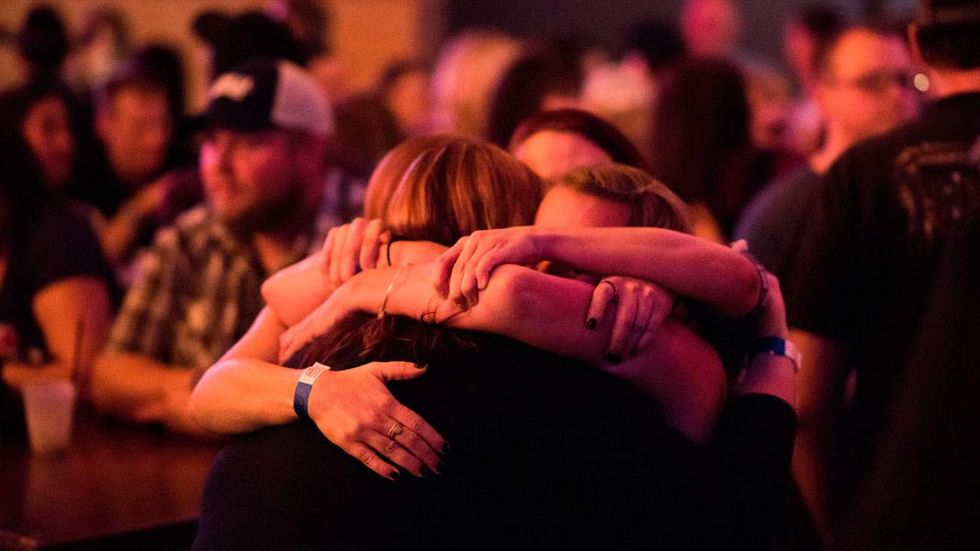
People embrace during a fundraiser for victims of the Las Vegas massacre. The committee for victim's fund says many people won't receive aid. (Robyn Beck/Getty Images)

Thousands of people impacted by the Las Vegas shooting are ineligible to receive aid from a $22 million fund set up to help them. And it’s happening even though members of the Las Vegas Victims Fund Committee expanded their eligibility guidelines, the Los Angeles Times reported.
Scott Nielsen, chairman of the fund, explains:
“It is our desire to recognize and honor all of those whose lives have been forever altered as a result of the horrific events of 1 October and we recognize the incredible needs of those experiencing psychological trauma,” Nielsen said in a statement.
“The overwhelming number of victims prevents us from providing individual monetary payments to those suffering psychological trauma, though we are committed to identifying mental health services to assist this critical segment of the survivor population,” he said in the Los Angeles Times report.
Hundreds were injured and 58 people were killed on Oct. 1 when Stephen Paddock, 64, reportedly opened fire on a crowd of about 22,000 people during the Harvest country music festival on the Strip. The Las Vegas shooting was the deadliest in modern American history. Aside from those injured or killed, thousands more suffered emotional trauma or visited a doctor.
The sheer number of people impacted means not everyone can receive a cash payout, according to the committee. Money for the fund came from donations for the victims.
Eligibility requirements for victims of the shooting have three tiers of priority.
The first priority goes to claims relating to individual deaths and severe injuries such as permanent brain damage or permanent paralysis, according to the Los Angeles Times. These people will receive the highest payouts from the fund, although amounts are not yet set.
The second level of priority is for “people physically injured on or before Oct. 10 who were hospitalized between the night of the shooting and Dec. 15.”
Finally, the third level is for people who were injured and received medical treatment “as an emergency or outpatient basis on or before Oct. 10,” according to reports.
The number of victims makes it difficult to provide aid to everyone who visited a doctor after Oct. 10 or who suffered from emotional trauma, the committee noted. Giving aid to all of these people would require more than $22 million, according to the committee.
In its final draft of the guidelines, the committee acknowledges that many people will not receive a payout.
“While it is not feasible to distribute money from the Fund to all of the individuals impacted by 1 October, it is important to recognize that the criteria set forth in this Final Protocol is by no means intended to devalue or minimize the trauma that has been experienced by a great many,” the document states.
The One Orlando Fund raised $27 million, and gave more than $17 million to families of those who died in the Pulse Nightclub shooting in Orlando, Fla., in 2016, the Los Angeles Times reported. Forty-nine were killed and about 60 were injured in that massacre. People who were hospitalized were eligible to receive between $65,000 and $300,000.
The One Orlando Fund gave $25,000 to each of the 186 people present at the night club who weren't hospitalized, according to the Los Angeles Times.